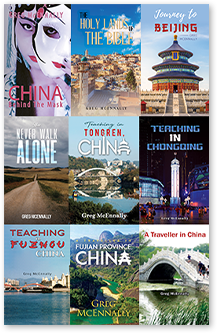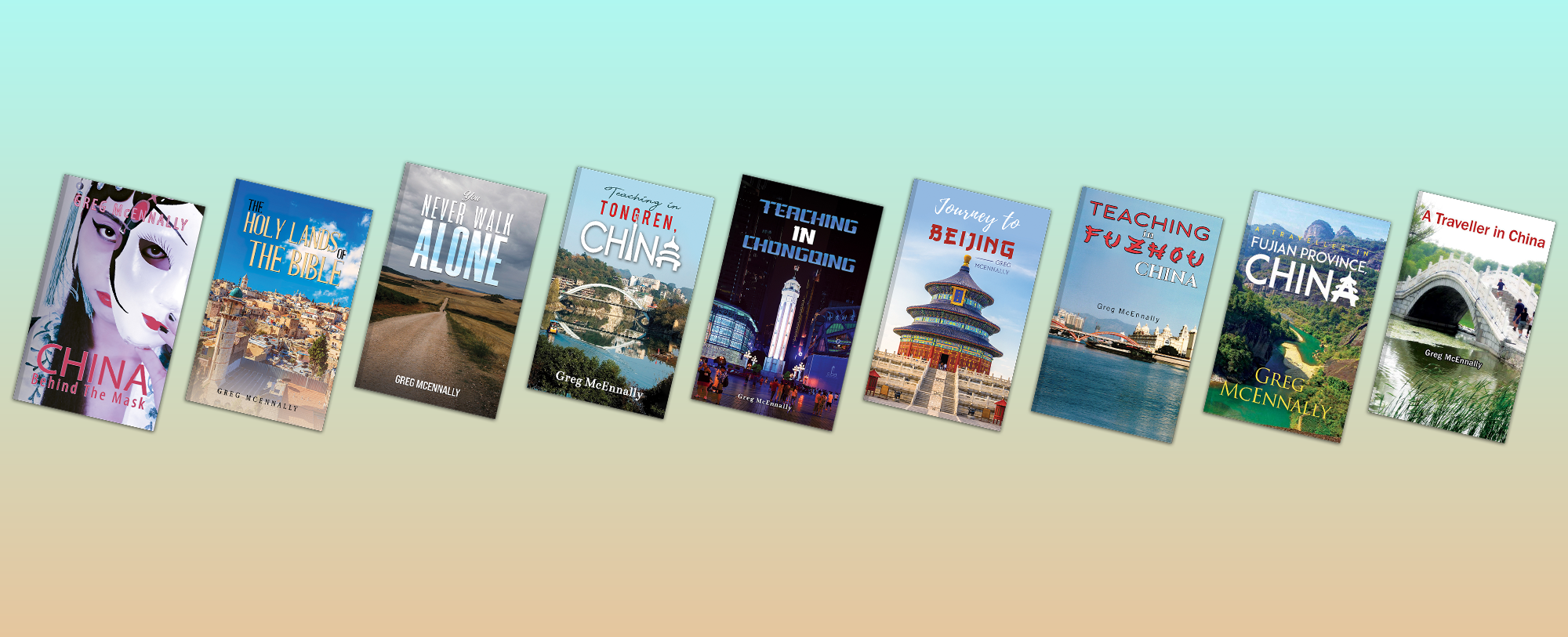

Greg McEnnally was born and raised in Sydney, Australia. For most of his life he has worked as a teacher, having graduated from Canberra University with a Bachelor of Applied Science. He taught science and mathematics mainly in Australia and Papua New Guinea, before switching to teaching English to speakers of other languages with a certificate from Cambridge University. Subsequently, he taught in Indonesia then ten years in China. In 2018, he walked the Camino in Spain, this book being an account of his experiences.
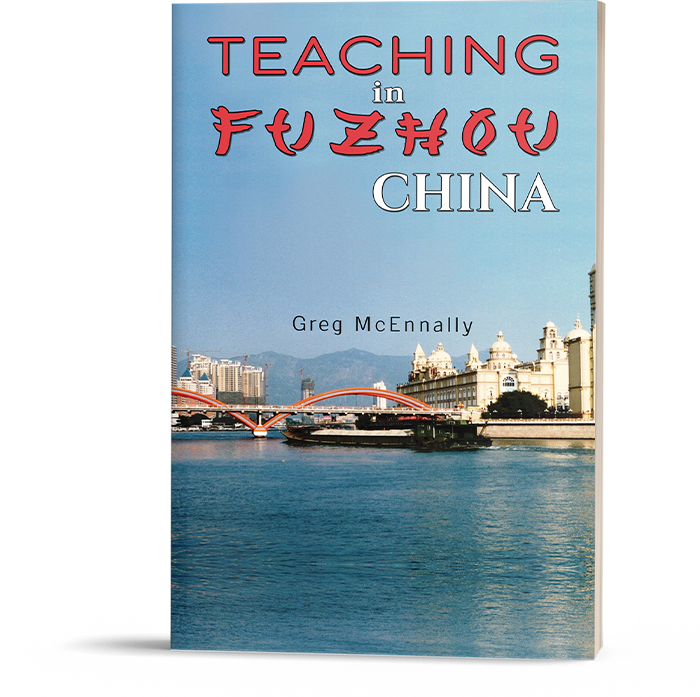
English is the world’s international language. Consequently, many speakers of other languages have taken great pains to make English their second language, mainly for practical reasons rather than for love of the language itself. Practical reasons include travel, business, academic intercourse and inter-governmental communication. China recognises this need and, in consequence, the author spent more than ten years in China, finding the experience interesting, enlightening and exciting, albeit at times frustrating. It was a wonderful time. In the author’s view, it is essential that the world comes to know and understand this huge empire. This book is full of observations from within the country, which should help in presenting China, its people, customs, educational systems and way of life, its contradictions and its attractions as well as its darker side. Most importantly, it gives some insight into how the people think – and this is important. Hopefully readers learn something while enjoying the experience.
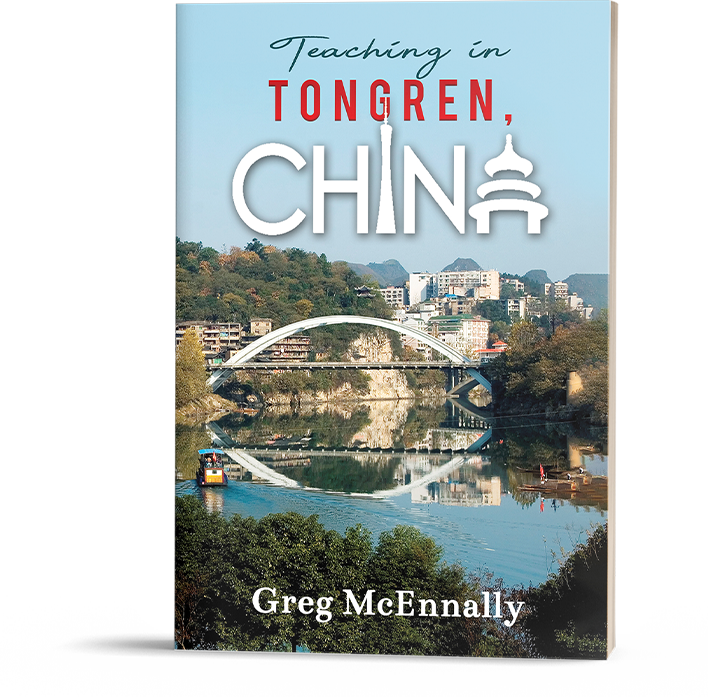
Since the accession of Xi Jinping as the supreme Chinese leader, the empire has been becoming increasingly aggressive, to the point of bullying. Its so-called “Belt and Road Initiative” seems designed to lure poorer nations into a debt trap, forcing them into subservience to Chinese demands. Its huge fishing fleet is encroaching upon the legitimate fishing grounds of many other nations. It is seeking to expand its territory to include almost the entire South China Sea, Taiwan, parts of India, Japanese islands, etc. Indeed most of “China” is conquered territory. Chinese efforts to control Australia have been extraordinary.
Yet is this the whole story? This book describes just how wonderful the Chinese people can be. The students I taught at Tongren University were amongst the best I have taught anywhere. It was not hard to love them.
The town of Tongren is itself quite beautiful, surrounded by conical hills and built around the green, winding Li Jiang River.
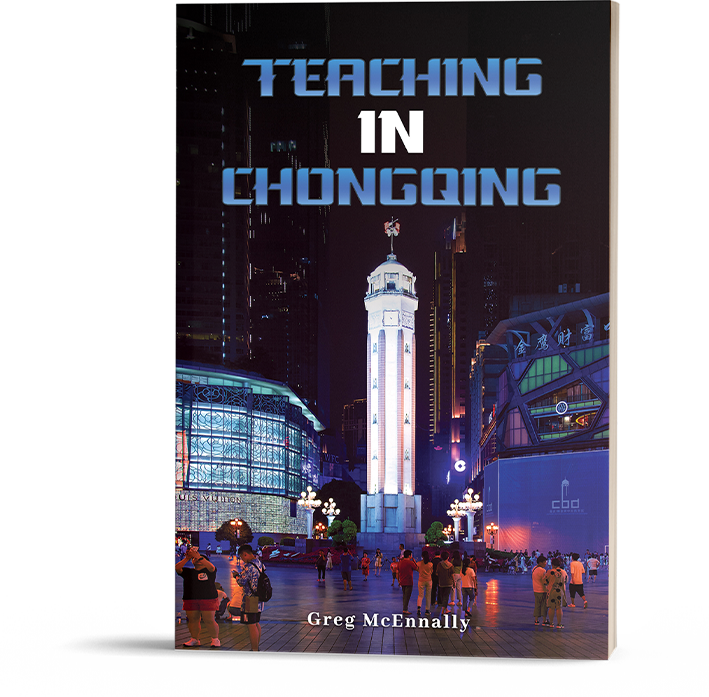
Today, China is so important. We need to understand why this empire (it is not a country) acts as it does. What are its intentions? This book is not a political analysis, but simply a record of one westerner’s experiences teaching English in Chongqing. Nevertheless, being part of the daily life of ordinary people has given rise to valuable insights. Chongqing is a major city with some 17 million people: it is not a backwater and was China’s wartime capital. But it is important for another reason. The popular mayor when the author began his time there was Bo Xilai, a rival to Xi Jinping; his subsequent removal and imprisonment says a lot.
The author’s daily experiences were fascinating, a real privilege to visit such interesting places and to meet so many wonderful people. These should be shared, which is what this book does.
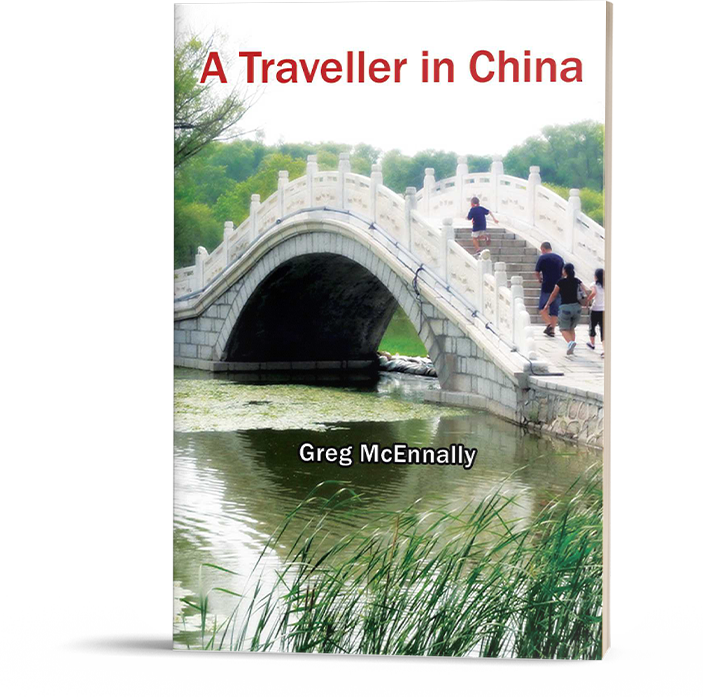
For Greg McEnnally a traveller should be a pilgrim and not just a tourist, and the journey itself is just as important as the destination. With this appreciation of life the writer takes us into China - a place many of us may never visit - and provides us with a developing picture of this strident and yet enigmatic country.
Having taught English for ten years in China the writer can depend on the hospitality of many of his former students and acquaintances as he takes advantage of the national holidays and tours the country. It is a country of contrasts; the wonderful companionship offered by ordinary Chinese set against the predatory taxi drivers; the brilliant architecture standing proud above the sea of rubbish that can be found alongside it.
It is a growing country, young in geology and yet old in culture. Greg McEnnally suffers the rigours of overcrowded buses and trains to bring the reader - China.
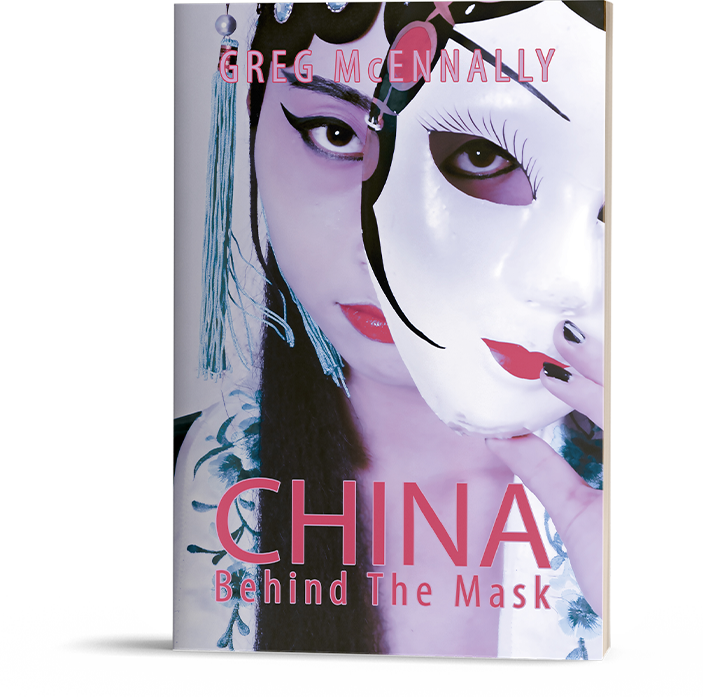
China Behind the Mask is not only an interesting, informative and enjoyable read but gives a thorough description of life in present-day China from the point of view of the author, an Australian English teacher, who lived in China for more than ten years. Not only does he provide a unique flavour of Chinese culture, but also presents a thorough analysis of the current political situation within China and how Chinese attitudes influence its relationships with other cultures and countries.
Part travel guide, part biography, part history, this book covers many aspects of China, particularly in relation to Australian life and culture. Some entertaining comparisons are made, which illustrate the divide between West and East in considerable depth. Personal anecdotes abound, bringing the book to life and ensuring that the reader is informed and entertained in equal measure.
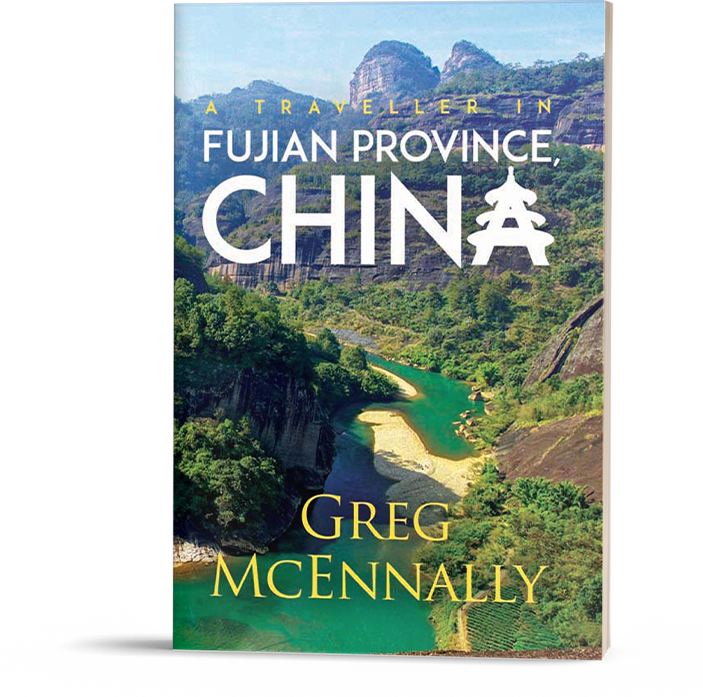
It is said that travel broadens the mind. This is true, but it does not happen automatically. One must make the effort to observe and appreciate. One must allow oneself to be affected and changed. During his four and a half years living in Fuzhou, Fujian Province, China, Greg McEnnally endeavoured to do just that, helped enormously by the people he met – and hence this book is dedicated to them. He also read as much as he could, and this also helped him come to a greater understanding and appreciation.
This book describes places: cities and towns, mountains and rivers, islands and countryside, but it also endeavours to present the people and their customs. The author found the whole experience exhilarating, informative and always interesting. It is hoped that the reader will share in this.
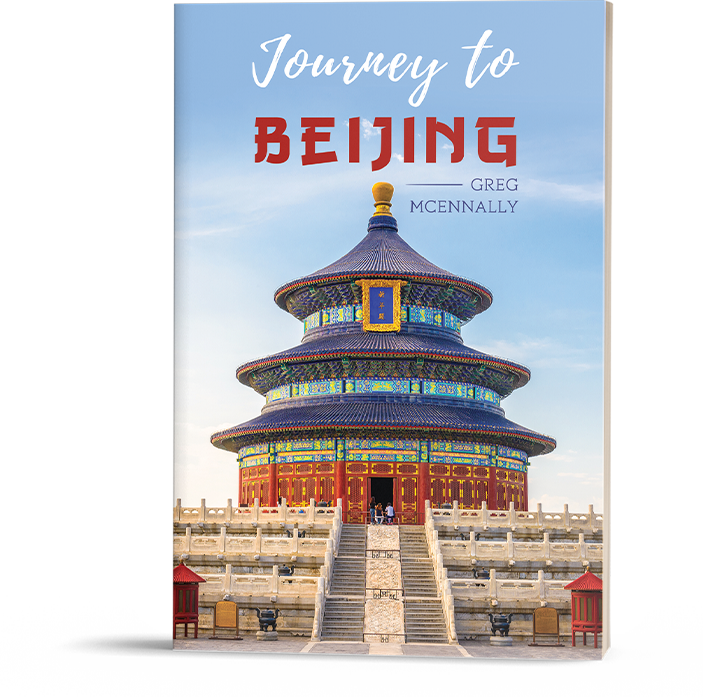
This book gives an account of some amazing places which the author was fortunate to visit in China--from magical Guilin to historical Zunyi; from the stunning Three Gorges to tropical Hainan; from cities of the eastern provinces to the Avatar mountains of Zhangjiajie; from relaxing Xishuangbanna to hectic Hong Kong and Macau; and in the north from the Mongolian grasslands of Nei Menggu to the heart of it all: Beijing.
Many people travel today, with something approaching 10,000,000 people in the air on an average day. Yet this is only a fraction of those who travel by other means. Why? For relaxation? For education? To get away? Or simply to say they have "been there"? On his own travels, the author saw many tourists arrive at a scene, struggle to get to a vantage point, get there, take the obligatory photograph and move on. They have not even looked, let alone appreciated where they are. All they are doing is ticking off places on their "bucket list".
In this book, the author is striving to delve deeper, especially when it comes to the significance of Beijing.
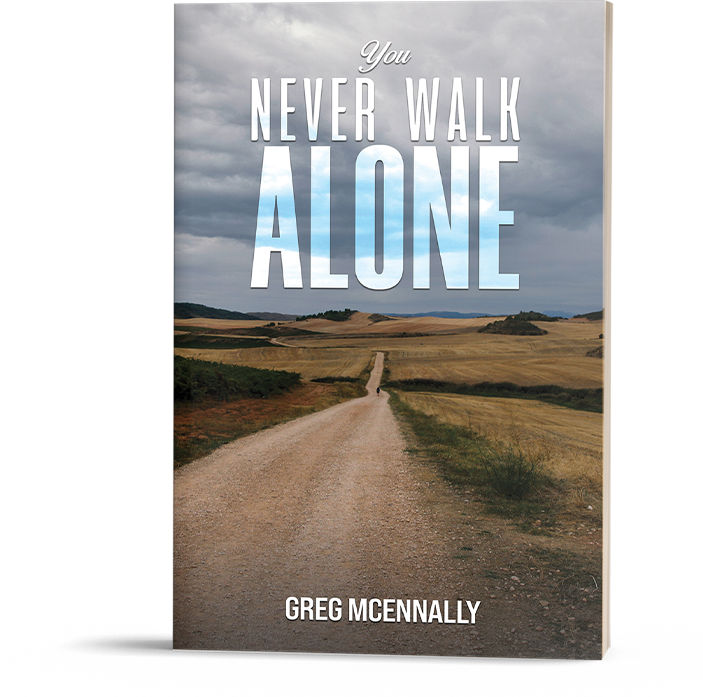
Today, numerous individuals find themselves adrift, seeking meaning in a world where various ideologies have faltered: Communism, Capitalism, Nationalism, Materialism. Amidst this ideological void, one ponders: What is the essence of life? Who or what can genuinely satisfy human yearnings?
Each year, hundreds of thousands embark on the Camino, or segments of it, in a quest for purpose. In 2018, I joined this pursuit, starting my journey on the Camino Frances from St. Jean Pied de Port in France and concluding in Santiago de Compostela, Spain. This 800 km trek, spanning forty days, was a solo venture, but as this book reveals, I was never truly alone. Along the way, I encountered numerous individuals, sharing not only the physical path but also profound connections.
I wholeheartedly recommend this pilgrimage – far more than a mere walk – to anyone earnestly seeking meaning in life.
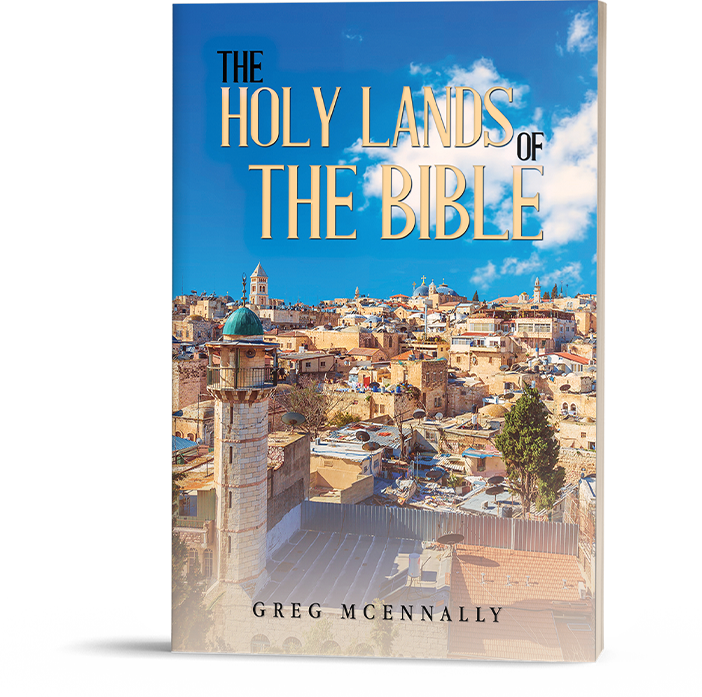
We are currently witnessing yet another war in the Middle East. Conflicts in this region between various groups have been ongoing for thousands of years. At one time there was even a Mongol army here. At various times the same groups have been fighting each other for centuries. With this background, how can this land be called “holy”?
The people of Israel were chosen by God to prepare the way for the coming of the world’s redeemer, Jesus, and it is Jesus who makes the land holy. This also includes other lands associated with the Bible: Egypt, Jordan, Turkey and Greece – and indeed extends to the whole world. I was privileged to have spent a significant amount of time in these lands, but realised that this involved an obligation to share.
This book is a record of my time in these countries in an attempt to share some insights and help in making these lands of the Bible stories come alive, thus enhancing our understanding of the Bible and Jesus. It may also be useful for those who are planning to make a pilgrimage to these lands.
Maybe it is no accident that these holy lands attract so much evil. Yet Jesus came to bring healing, forgiveness and peace.
Austin Macauley are one of the fastest-growing publishers, striving hard to give authors the best chance of succeeding in an increasingly crowded market. With headquarters in London, New York and Sharjah, Austin Macauley Publishers™ have established themselves as an energetic and innovative independent trade publishers.
+44 (0) 207 038 8212
+44 (0) 203 515 0352
mail@austinmacauley.com
Austin Macauley Publishers™ Ltd.
1 Canada Square, Canary Wharf,
London, E14 5AA
United Kingdom

